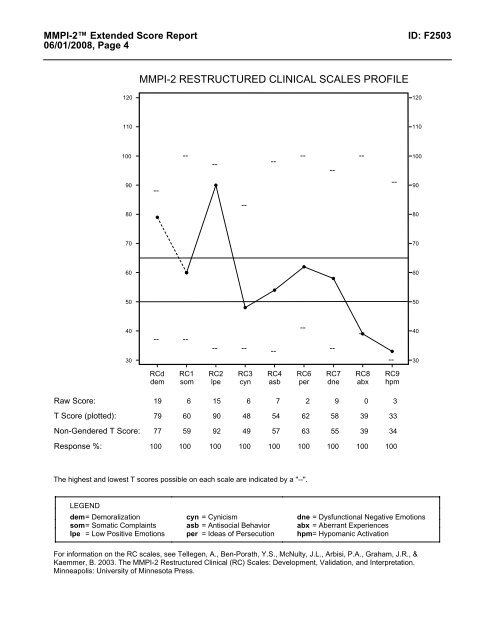

Manual Scoring – Administer assessments on answer sheets and score them yourself with answer keys and profile/record forms. Mail-in Scoring Service – Specially designed answer sheets are mailed to Pearson and are processed within 24–48 hours of receipt results returned via regular mail. Q Local™ Scoring and Reporting Desktop Software – Enables you to score assessments, report results, and store and export data on your computer. Q-global™ Web-based Administration, Scoring, and Reporting – Enables you to quickly assess and efficiently organize examinee information, generate scores, and produce accurate comprehensive reports all via the Web. See the MMPI-A Extended Score Report or the MMPI-A-RF Score Report for alternatives most similar to the Basic Service Report. The Basic Service Report has been discontinued. This report provides raw and T scores for all standard MMPI-A scales as well as the PSY-5 Scales, Content Component Subscales, and critical items.Įxtended Score Report Basic Service Report Outpatient Mental Health Interpretive Reportĭrug/Alcohol Treatment Interpretive Report Extended Score Report Inpatient Mental Health Interpretive Report Specialized reports are available for the following settings:
Content Component Scales (reported only). Clinical Subscales (Harris-Lingoes and Social Introversion Subscales) (reported only). Supplementary Scales profiled with alcohol/drug scales interpreted. Content Scales profiled and interpreted. Validity and Clinical Scales profiled and interpreted. The report presents the following scales: A list of omitted items and suggested items for follow-up. Diagnostic and Treatment Considerations. Williams, PhD, provide information on the following: This comprehensive report helps provide an objective psychological picture of the adolescent through scale scores, special indices, and narrative statements.īased on extensive experience in MMPI and MMPI-2 research and clinical practice, authors James N. The sites were chosen to maximize the probability of obtaining a balanced sample of subjects according to geographic region, rural/urban residence, and ethnic background. The normative sample of the MMPI-A test consists of 805 adolescent males and 815 adolescent females from eight communities in the U.S. 
INTR – Introversion/Low Positive Emotionality PSY-5 (Personality Psychopathology Five) Scales MAC-R – MacAndrew Alcoholism Scale–RevisedĪCK – Alcohol/Drug Problem Acknowledgment Sc5 – Lack of Ego Mastery, Defective Inhibition

(Extended Score Report and The Minnesota Report)Ĭlinical Subscales - Harris-Lingoes and Social Introversion Subscales
Scales help address problems clinicians are likely to see with adolescents, including family issues, eating disorders, and chemical dependency. At the psychologist’s discretion, the clinical scales and three of the validity scales can be scored from the first 350 items, a significant savings in administration time. Item content and language are relevant for adolescents. Guide professionals in making appropriate referrals. Provide easy-to-understand information to share with parents, teachers, and others in the adolescent’s support network. Identify the root causes of potential problems early on. Support diagnosis and treatment planning in a variety of settings. School, clinical, and counseling psychologists can use this self-report inventory to help: Offering reports tailored to particular settings, the MMPI-A test helps provide relevant information to aid in problem identification, diagnosis, and treatment planning for youth (ages 14–18). An empirically based measure of adolescent psychopathology, the MMPI-A test contains adolescent-specific scales, and other unique features designed to make the instrument especially appropriate for today’s youth.







 0 kommentar(er)
0 kommentar(er)
